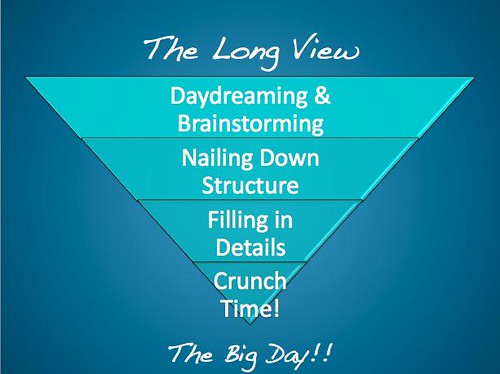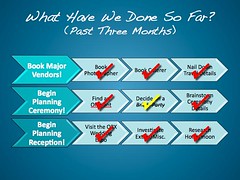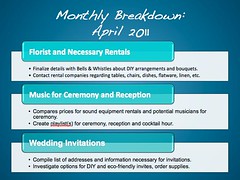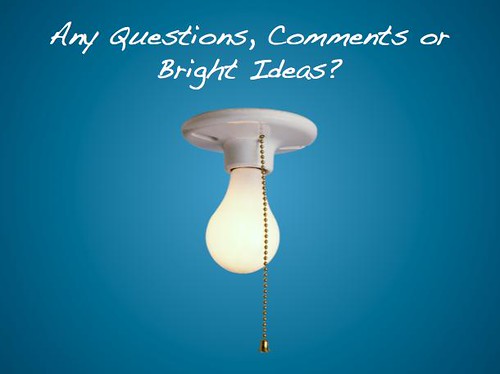On Friday, with five months, three weeks and one day to go until the wedding, it seemed like smooth sailing. Everything had gone wonderfully so far, and we were on schedule for all of our major wedding planning deadlines. Jeff and I were excited for our meeting with our officiant the next morning, looking forward to sitting down to a long talk about how to incorporate
Druidic themes into a beautiful ceremony that would honor our families, our heritage, the land, our gods and one another.
On Sunday, with five months, two weeks and six days to go, and Mercury about to go retrograde (in fiery, combative Aries!)…. well, let's just say, it probably shouldn't be a surprise if the next few weeks get a little bumpy.
Clear Sailing, Rough Waters
To be honest, after some of the horror stories I've seen circulating online, we should probably be thankful that we've only just had our first major snag during the past six-plus months of wedding planning. We were able to choose our preferred date at a beautiful venue and book our first choices for photographer and caterer. We've narrowed down our bride and groom attire to some gorgeous and inexpensive outfits made from sustainably grown hemp and cotton, and we're in conversation with a local florist who might be able to provide in-season bouquets and arrangements from their earth-friendly gardens and flower fields. We're in the process of setting up gift registries with a few co-ops, nonprofits and charities, and we're starting to plan our honeymoon trip to some of the sacred landscapes out west where we'll be able to camp beneath clear night skies full of amazing, blazing stars. And we're happier and more in love than ever.
But we don't have an officiant.
Having an officiant willing to perform a Pagan wedding ceremony is immensely important to both of us, and so from the beginning we made sure that finding one was at the top of our wedding to-do list. When the possibility of marriage first came up last year, I spent hours and hours online doing research into the marriage laws in different states. I sent out a call among my various Pagan network contacts looking for people in the Outer Banks area who might be able to perform a Pagan wedding, and I got in touch with some folks who'd had Pagan weddings or handfastings of their own, to find out how they'd handled it and what advice they had to share. We'd found our officiant even before we'd commissioned the
engagement ring. We talked with my parents about having a Druid wedding, and we began spreading the word among family and friends that our ceremony would be a bit different from what they were used to (though it would still be about love, and promises, and community, and Spirit). We thought we'd covered all our bases.
The irony, of course, was that finding an officiant so early meant that there was plenty of time for things to go wrong. The officiant we've been working with recently received some personal news that has thrown his schedule for the coming year into chaos, and he's no longer able to commit to our wedding date in September. We were sad to get this news this past Saturday when we called to confirm our meeting with him — in part because chaotic situations are never easy, and we're wishing him well that everything works out and settles down soon — but I've always been a Girl With the Backup Plan, and we do still have more than five months to work things out, so I wasn't too phased.
What did phase me was the reaction of my parents when they heard the news on the phone. Jeff and I had been trundling along with our plans for a Pagan wedding, confident that we had the support and understanding of our family and friends, many of whom come from diverse religious and spiritual backgrounds themselves. We began this blog as a place to talk about our spirituality and its role in our upcoming wedding and marriage so that our guests would feel comfortable participating and celebrating with us on our special day. Every once in a while, my parents would inquire about the legality of a Pagan wedding, but by assuring them that our officiant was certified to perform marriages in the state of North Carolina and we'd have all the legal documents set straight just like any other wedding, I was able to put their anxieties to rest — or so I thought.
But revisiting the problem of finding an officiant has brought all the questions about religious tolerance and legitimacy, and the role of government in marriage, right back to the surface again. These are difficult conversations to have even at the best of times, and Jeff and I will be the first to admit that we're far from wishy-washy in some of our opinions. Heck, the stress of an up-coming wedding can make it difficult to discuss even unimportant things like invitation deigns and centerpieces. And did I mention, Mercury retrograde in Aries? Yeah.
What Makes a Marriage
What it all boils down to is really just this: What makes a marriage? What is it that makes a wedding "legitimate"? When do two people go from being engaged, to being officially married?
Is it the ritual itself, exchanging rings and saying vows? Is it the legal document they sign that grants them special privileges and rights as a married couple under the law? Is it the support of their families and communities, accepting and acknowledging them as a couple joined in matrimony? Is it some combination of all of these — and if it is, how exactly do we go about combining them?
Jeff and I have had long conversations about these questions, because in many ways they're the same questions that we asked ourselves when we first started to talk about getting married. What exactly would "getting married" mean? How would it change our relationship? How would it change the familial and community structures in our lives? These kinds of questions become very important for divorcés with children, because kids expect answers and deserve thoughtful replies from the adults that they look to as examples and role models. We needed to be able to explain why we were taking plenty of time to make that commitment instead of rushing in headlong, and why marriage was different from simply living together. We needed to explain why we were choosing to have a Pagan ceremony, instead of a Christian-flavored civil ceremony officiated by a family friend like their mother had for her second wedding. And we needed to explain about the importance of marriage equality, and why their friend up in Massachusetts could have two moms who were married to each other, while a kid living in another state couldn't have two married parents of the same sex, no matter how much they loved each other and their children. We needed them to understand that what makes a marriage isn't just the government saying it's okay.
These distinctions — between church and state, community and government — are vital not only to same-sex couples fighting for their rights under U.S. law. They're also immensely important to religious minorities in a country where Christianity (and its close relative, Judaism) receive a certain amount of privilege that most people take for granted or may not even notice. Although
freedom from religious persecution is protected in the Bill of Rights, the
freedom to enjoy all of the same privileges as the majority are often only won through long years of hard work and drawn out legal battles.
When it comes to marriage,
Christianity enjoys an unrivaled privilege in this country not shared by other religions. In some states in the U.S., the
only religious clergy who can perform legally binding marriages are "ministers of the gospel." In others, this privilege is extended to any licensed clergy-person of a "recognized religious society" within that state. But this often excludes Pagan traditions that are perceived as merely "occult" or "superstitious," that might not have established religious communities in the local area, or that structure their religious communities in ways that differ from the Christian norm. This restriction doesn't just apply to Pagans, either. Quakers, whose wedding ceremonies involve the couple declaring their marriage before a committee, require a separate civil ceremony
in every state except Pennsylvania (where the strong historical influence of Quakerism has resulted in more religiously tolerant laws and a unique "self-uniting marriage license"
available to religious and nonreligious folks alike).
For this reason, it is not uncommon in the United States for members of non-Christian religious minorities to have a civil marriage for legal reasons that is separate from their religious wedding ceremony. In fact, in many countries in Europe, including France and Germany, this type of
civil marriage is mandatory, sometimes excluding religious language altogether. Couples who wish to hold a religious wedding ceremony must hold a separate ceremony only after they've secured a legal civil marriage in the eyes of the law.
There are many reasons why Jeff and I are ambivalent about the role of government in our marriage, not least of which is the so-called "Defense of Marriage Act" which enshrines discrimination and intolerance at the federal level. Some Pagans (and Quakers, and even some Christians, for that matter) choose not to register their marriage with the government as a protest against religious discrimination, or in solidarity with those who are disenfranchised or robbed of their rights. Because Jeff has children from a previous marriage, however, seeking legal status for our marriage is our best way to safeguard his rights as a father and legally recognize my role in their lives as a step-mother. But in the end, the legal details are about as important to us as applying for a passport — some hoops to jump through and some paperwork to sign just to make sure things don't get messy or problematic down the road.
When we found an officiant who had both experience and a willingness to perform Pagan weddings, and the legal status of an ordained Christian minister, we hoped that we could get the "legal stuff" taken care of in one fell swoop to save us some hassle. But we'd always known that a separate civil ceremony might be necessary to make our marriage "official" in the eyes of the law. Now, even though we are still looking for an officiant who has the credentials to combine the religious and legal aspects of our wedding into a single ceremony, it seems we may also have to consider a separate civil ceremony as a possibility.
Love Makes a Marriage
Which brings us back to the question: what makes a marriage? Christians will be familiar with the idea that a couple can be married both "in the eyes of the law" and "in the eyes of God," though they may be unaware that they are privileged to be able to accomplish both in a single ceremony. For those of us without this privilege, who may have to hold both a civil ceremony and a religious ceremony, the question becomes: which is the one that really "counts"?
We can't look to the government for an answer to this question. The law has already told us that our religion doesn't always count as legitimate, and that our clergy cannot perform legally binding marriages unless they obtain special licenses or supplemental Christian ordination.
Jeff and I already know which kind of ceremony is the one that "counts" for us. It's the one where we exchange vows of fidelity and love before our gods and the spirits of the land. It's the one where our family and friends gather to support us and celebrate our marriage, and to acknowledge the importance of our spirituality in our lives and in our partnership. To us, the wedding that begins our marriage will be like
the proposal that began our engagement: a simple ritual and a simple promise, out beneath the open sky, overlooking blue-brilliant waters, feet firmly planted on the solid earth. We needed no government paperwork to acknowledge our engagement — we are engaged in the eyes of our families and friends, in the eyes of our gods, and in the eyes of each other. The same will be true of our marriage. We will celebrate our anniversary on that day in September when we stood together on the shore, on the threshold, on the edge, and took that leap into our future. Regardless of when the paperwork got done.
As Druids, we believe that ritual has power, that it resonates on levels beyond the physical world. Ritual changes who we are, emotionally, psychologically and spiritually. We would not tell our Catholic family members that their religious rituals didn't "count" unless they were government-sanctioned. We wouldn't suggest that two Jewish friends could go off and have their quaint little ritual on their own time, as long as the "real" wedding was a civil ceremony presided over by an atheist government official who didn't care about their religious views. We would want our family and friends to celebrate and support our union even if we were a same-sex couple denied the right to marry by a government still deeply entrenched in the prejudices and biases of a homophobic religion.
And so, we feel strongly that the role of government in our marriage should be limited to the technicalities of paperwork and should not be enshrined in our wedding ritual as the primary authority from which our marriage derives. Our marriage will be built upon a foundation of love and reverence for Spirit, not on the legal technicalities of the State. It is that love and reverence that we want to celebrate and acknowledge at our wedding. The government is more like that embarrassing uncle nobody likes, whom you have to invite just to keep the peace. (That's a metaphor — all of our uncles are awesome.) But we'll be damned if we're going to cater to Uncle Sam when he starts dolling out the religious intolerance. If that's how he's going to be, then he can just bloody well not come, thank you.
With that in mind, we want to ask our family and friends to meet us halfway — to help us make our wedding day special and celebrate our love with us, without getting bogged down by worries about who signed what and when in front of which county judge. None of that matters to us. What matters to us is that our family and our community support our choice and our right to hold a religious wedding ceremony in the spirit of our tradition. What matters to us is that, at the end of that day in September, we're married in the eyes of our gods, in the eyes of our ancestors, in the eyes of each other and in the eyes of our community. If the law has blinders on, this is a minor technicality that Jeff and I will work out.
 On the heels of yesterday's post about the legal and religious aspects of tying the knot, I wanted to point family and friends towards the wonderful and inspiring website Offbeat Bride, where they have a whole subcategory for brides who celebrate their wedding day with family and friends after they've gotten the legal ceremony out of the way. (They call it, tongue-in-cheek, "getting weddinged.")
On the heels of yesterday's post about the legal and religious aspects of tying the knot, I wanted to point family and friends towards the wonderful and inspiring website Offbeat Bride, where they have a whole subcategory for brides who celebrate their wedding day with family and friends after they've gotten the legal ceremony out of the way. (They call it, tongue-in-cheek, "getting weddinged.")






